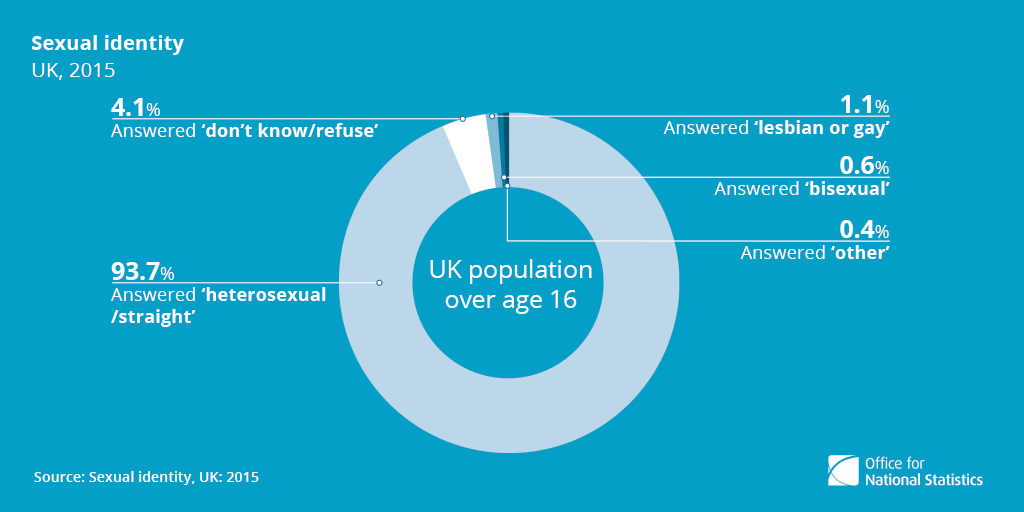People who identify as lesbian, gay, and bisexual (LGB) tend to rate their quality of life as lower than the UK average, ONS analysis shows.
By publishing this analysis as Pride takes place around the world, we mark the celebration of equality and diversity by contributing to the debate around societal inequalities in regards to sexual identity.
Understanding how people feel about their lives and how that links with sexual identity is key to the ongoing issue of how policy makers can address these inequalities.
Across all positive ONS metrics of quality of life1, life satisfaction, happiness, and perception that things they do in life are worthwhile, people who were heterosexual or straight rated each of these aspects of quality of life higher than their LGB counterparts.
People who identified as bisexual had the biggest well-being gap, reporting significantly higher levels of anxiety than any other group, as well as reporting lower levels of life satisfaction and happiness. Three in 10 (30%) of those who identified as bisexual reported high levels of anxiety, compared to two in 10 (19%) heterosexual or straight people.
Difference in personal well-being ratings by self-reported sexual identity compared with UK average, 3 years ending December 2015
Embed code
Embed code
Embed code
Embed code
Note: Lighter coloured bars, and heterosexual or straight bars are not statistically significant
Those who identify as “other” or “do not know or refuse” also said they had lower life satisfaction, happiness, and worthwhile than the UK average.
How big is the LGB community in the UK?
ONS figures2 based on the 2015 Annual Population Survey suggest there are an estimated 920,000 people in the UK who identify as gay, lesbian, or bisexual, making up 1.7% of the population. London has the highest proportion of LGB-identifying population.
According to the same ONS figures, more men say they identify as LGB than women, but more women than men identify as bisexual. Another 2.2 million people say they don’t know, or refuse to answer, while an estimated 206,000 identify as "other".
 Note: Numbers do not add up to 100% due to rounding
Note: Numbers do not add up to 100% due to rounding
Discrimination may explain some of these differences
We don’t actually know why people belonging to the LGB community report lower quality of life. This analysis is an initial step towards highlighting differences but does not take into account a range of factors known to influence well-being when comparing groups. Research carried out by Stonewall found that one in five LGB employees experienced verbal bullying, and a quarter of them were not open to colleagues about their sexual orientation.
The National Institute of Economic and Social Research published a report which found LGB people were more likely to suffer with mental health problems. It outlined potential exposure to discrimination and harassment in relation to all aspects of life, including health service access, education, and employment.
Some 12% of all hate crimes in England and Wales in 2015 to 16 were related to sexual orientation, according to Home Office figures, with 7,194 sexual orientation hate crimes recorded. However, only a quarter of people who are victims of such hate crimes actually report it (Galop’s 2016 Hate Crime Report PDF), so these incidents are vastly under-reported. Crime Survey estimates suggest that between 2012 and 2015 there were, on average, 29,000 sexual orientation-related hate crimes each year.
2006: ONS Sexual Identity Project launched
2009: Sexual identity questions first introduced onto the Integrated Household Survey
2011: First experimental statistics published on sexual identity
2017: Personal well-being and sexual identity analysed together for the first time
What next?
There are calls to include questions on sexual identity on the 2021 Census for the first time. We are exploring this as a possible opportunity to gather more comprehensive, in-depth data that would help policy makers to have a better understanding of the LGB community in England and Wales.
Other Visual.ONS articles:
Sexual identity in the UK in 2014
If you like our Visual.ONS content and would like to see more, please sign up to our email alerts, selecting "stories and infographics" under preferences.
For more information, please contact: QualityOfLife@ons.gov.uk or pop.info@ons.gov.uk
Footnotes:
- The four personal well-being questions are:
- overall, how satisfied are you with your life nowadays?
- overall, to what extent do you feel the things you do in your life are worthwhile?
- overall, how happy did you feel yesterday?
- overall, how anxious did you feel yesterday?
People are asked to respond on a scale of 0 to 10, where 0 is “not at all” and 10 is “completely”.
- We have worked to estimate how many people identify as LGB nationwide. It’s not included on the Census, and some people refuse to answer questions about their sexual identity. As such, estimates vary quite widely.
